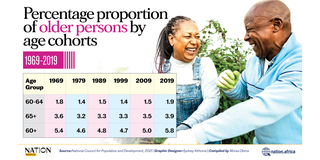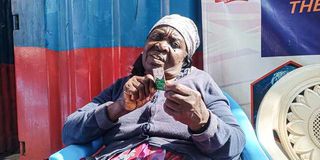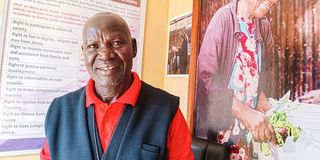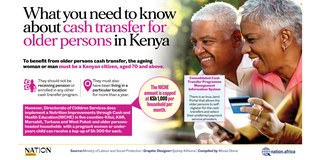Ageing in poverty: The plight of older, disabled women in urban areas
What you need to know:
- Studies have found that social protection schemes result in reduced household poverty, eliminate exposure of age-old poverty among children, lower rates of school dropout besides boosting physical and mental health.
The government, however, only provides social assistance through the Inua Jamii scheme, for those aged 70 years and above.
On a sunny mid-morning, I meet Emily Chepkurui aged 80 at a daycare centre for the ageing persons in Kibra, an urban low-income settlement in Nairobi City County.
She is warm and welcoming but slow in movement due to her age. As we sit down, on June 12, 2024, near a tree behind the centre, she shoots a question that tells of her current status of life. I’m here to speak with her as a beneficiary of Inua Jamii (Kiswahili for uplift a community or family).
“Do you know anyone who can buy liquid soap? I have some in this red carrier bag,” she asks me as she points at her bag.
Emily lives in Kibra in a house where she pays a monthly rent of Sh3,000, inclusive of electricity, buys water at Sh5 for a 20-litre drum, and must buy food every day.
She also needs at least Sh5,000 for a healthy diet and to manage the ageing health conditions weighing her down.
At her age, she is a special category of population in Kenya, having clocked 60 years, the age at which the Constitution considers her as an older person who needs care and protection from the State.
The government, however, only provides social assistance through the Inua Jamii scheme, for those aged 70 years and above.
Inua Jamii is an umbrella term for cash transfers for the poor and at risk of harm under the government’s National Safety Net Programme.
Included in the Inua Jamii scheme are the older persons together with orphans and vulnerable children, persons with severe disabilities, and hunger safety net programme for the poorest in eight arid counties, namely Turkana, Wajir, Mandera, Marsabit, Garissa, Tana River, Isiolo, and Samburu.
For six years, every two months, the older persons received a monthly tax-financed pension of Sh2,000. This changed from January this year, after President William Ruto directed their cash transfers to be disbursed each month.
Emily is one of the 833,129 elderly citizens, currently receiving the money. But as an urban poor ageing woman, living in an economy of shooting inflation and rise in rent, Sh2,000 cannot be stretched thinner to cover all her needs.
“I have to hawk the soap, otherwise, I’ll be kicked out of the house or sleep hungry,” she says.
Every Kenyan has a right to enter, remain and reside anywhere in Kenya.
And for Emily to live here is enjoying the rightful freedom to decide where to settle in old age. Six per cent of the 47.5 million Kenyan population are older persons, translating into 2.7 million of them, according to the 2019 census.
By 2050, according to the United Nations Population Fund East and Southern Africa Regional Office, their proportion will have risen to 10.3 per cent, which means unavoidable expansion of the social security bundle.
As per the Constitution, it’s not just enough for the government to give social security to the older persons, the protection ought to foster their human rights.
Article 43 requires the government to provide appropriate social security to persons who are unable to support themselves and their dependants.
The Constitution too demands of the State to extend this care to the over 60-year-old women and men in a “reasonable” manner to enable them to live in dignity and respect as well as free from abuse.
Disease burden on ageing women
Studies have found such social protection schemes result in reduced household poverty, eliminate exposure of age-old poverty among children, lower rates of school drop outs apart from boosting their independence, physical and mental health.
Women constitute 55 per cent of the older persons in Kenya, meaning higher numbers of older women suffer from the “the unreasonable” cash transfer, especially those in the urban areas who must spend on everything to survive.
Mary [identified with her first name to protect her dignity and privacy] exemplifies this living experience. The 75-year-old also lives in Kibra with her niece and nephew. She became the sole caregiver of her sister’s children after she died years ago.
At the time, she sold second-hand clothes to support her household. With the ageing, set multiple health conditions making it impossible for her to work.
“The Sh2,000 I get is split between food, rent and my medicine. When there is nothing, we sleep hungry. Occasionally, we get food donations from neighbours, well-wishers and even church. The children stopped going to school. It hurts me, but what can I do? If I still had the energy, I’d be selling second-hand clothes,” she says.
The fact that Mary sleeps hungry even after receiving the Inua Jamii cash, defeats the reason behind creation of that kitty, expected to lift older women and men from poverty and give them a dignified life.
Unfortunately, older women are more disease-burdened than men, and if it wasn’t for the competing needs, it would be swallowed by medication costs.
All the 11 women I interviewed in Nairobi and Kiambu counties, in the age range of 64–80, said they were struggling with more than one health condition, the common being osteoarthritis, high blood pressure and hypertension.
While out of the 10 men sampled in the similar age bracket, only one said he has consistent pains on his left leg. He was injured in a vehicle accident years earlier.
Neglecting older persons is costly to an economy, warns Dr Gloria Langat, the head of the ageing and development at the African Population and Health Research Centre.
“When we neglect an ageing population by failing to properly support them means we have a large proportion of people who are living in poverty or vulnerable,” she says.
The research scientist recommends expansion of the cash transfer for the elderly persons’ programme by lowering the age to 60 as Kenya’s life expectancy is lower than that in developed countries.
As of 2022, life expectancy at birth for women stood at 66.5 years compared to 60.6 years for men, according to the Economic Survey released in the same year.
Comparatively, as of 2023, in the developed countries, life expectancy for women is 82 years, and 75 years for men.

Gendered impact
There is a gendered impact of the “unreasonable” cash transfer for the older persons. It predisposes the men to domestic violence, and women left with grandchildren are stressed over how to educate them, forcing them to strain to work.
Peter (identified with her first name to protect his dignity and privacy) who lives in Dagoretti South, Nairobi, always conflicts with his wife over the money.
“We always argue over the money. She says I lie over the amount I receive and I have to explain to her how I spent the money,” says the 78-year-old Peter.
For Mailo (name changed to protect his privacy), in Kahawa Wendani, Kiambu County, his wife has to accompany him to the bank to withdraw the money.
“I withdraw all the money and give it to her. She is the one to decide how to spend it. My left leg often hurts. I had an accident a long time ago. She is the one to decide whether she will buy me the medicine or not,” he says.
His wife didn’t see a problem with the arrangement.
“I usually tell him to pray to get healed. We don’t have the money for his medicine. If I left him to budget for the money, he would misuse it,” she argues.
Mary Karanja is a grandmother and sole caregiver of a six-year-old granddaughter.
The 72-year-old says she cannot imagine seeing her drop out of school.
“Every term, I have to pay Sh5,000 and since the Sh2,000, I receive is not enough to cover the fees, her needs and mine, I have been forced to start a grocery to supplement the cash transfer. I’m already worried that by the time she finishes primary school, I’ll be too old to educate her,” she says.
Multiple challenges for those with disabilities
Even so, those with disabilities face greater challenges from access to information, registration, reach of the funds and disproportionate effect of the “unreasonable” amount.
There are 900,000 people with disabilities in Kenya going by the 2019 census, out of which 2.5 per cent are women and 1.9 per cent, men.
“There is no resource centre for older persons with disabilities to visit and learn about Inua Jamii. Even when the government does new registrations, it announces using public speakers. What about those who are unable to hear?” wonders Boniface Nzinga, chairperson of Kibra Disabled Group.
“Registration is done in places too far from their homes and the infrastructure does not favour those using wheelchairs. Registration forms are also written in small font sizes. We can’t read. They also don’t have an audio format for those unable to see.”
The barriers extend to accessing the money deposited in the six banks contracted to disburse the money to the elderly citizens.
“The banks are so far away. The bank agents are too far. Travelling is a nightmare for them as vehicles are not customised for the disabled. The doorsteps for the PSVs are too high, and no one cares,” Boniface complains.
And because of the logistical terror, they suffer to access their old-age financial support.

Gladys Ayuma Shitandai shows her Inua Jamii ATM card during the interview at Kibra on June 12, 2024.
“I prefer walking. It's tiring but what do I do? The matatu (PSV) operators don’t care if you're old and with a disability. They will shout at you to get in quickly and before you sit, the driver is already moving. They are so inconsiderate,” Gladys Ayuma Shitandai says.
She uses a walking stick as her left leg is disabled. It takes her about three hours to walk from her residence in Laini Saba to Ayany to get her money from Kenya Commercial Bank, ATM. The Inua Jamii beneficiaries have a special ATM card.
By road, Laini Saba and Ayany are 2.9km apart and for an able person, it's a 43-minute walk. But Gladys takes longer as she has to rest in-between the walk before she continues with the journey.
Innovative strategies
Aware of the challenges the urban elderly women and men face, organisations have partnered with the Ministry of Social Protection to close the loopholes.
HelpAge International, a global pro-older persons’ rights organisation, is one such partner that has empowered at least 14,000 older women and men in the urban low-income settlements in Kibra, Dagoretti North and Dagoretti South, in Nairobi, through sustainable community-driven innovative strategies.
“This year, our empowerment project for the Inua Jamii 70+(over 70 years’ older persons) in these areas will come to an end. But as the project, funded by the French Development Agency (AFD), comes to an end, we are glad we impacted positively the lives of the older women and men,” explains Lydia Makena Micheni, the programmes officer at HelpAge International.
“We recorded an increase in the number of older persons receiving Inua Jamii cash transfer, thanks to the project. They also became aware of their rights and entitlements that now they are holding the government and those in authority to account.”
In collaboration with local organisations – Kibera Day Care Centre for the Elderly, and Kenyan Aged People Require Information, Knowledge & Advancement – they mobilised the older persons to form Older Persons Associations (OPAs) as community-based self-help approach to improve the quality of their lives.
“The OPAs serve as a platform for education and awareness, learning and initiating small income-generating activities,” she says.
They also offer an avenue for peer-to-peer learning, networking to alleviate loneliness and isolation, and promote their welfare through home visits.
During the OPA meetings that take place on a weekly, bi-weekly or monthly basis, the members also participate in healthy ageing activities and exercises for improved quality of health like singing and dancing.
They were also equipped with business and leadership skills, and growing their old-age wealth through table banking.
Of the 14,000 elderly persons, 60 per cent are women and 40 per cent, men. In total, two per cent of the beneficiaries are those with disabilities.
Out of the engagements, over 50 OPAs have been formed, consisting of members from different villages in Kibra, Dagoretti North and Dagoretti South.
They meet regularly – weekly, bi-weekly or monthly – to lift each other’s burden by sharing the good and bad stories.
“They also visit each other, and so if any of them is sick, they can intervene. This has really helped in improving their wellbeing, and it eliminates the aspect of loneliness and isolation, which then uplifts their mental and physical health,” Lydia asserts.
Within OPAs, there are older citizen monitor (OCM) groups selected by their peers to monitor services rendered to older persons in the community. These groups also develop and implement advocacy strategies that address key concerns and issues identified by older people in the community.
The OCMs focus on three thematic areas, namely access to quality health, income security, and access to social protection.

Michael Ouma, an older citizen monitor in-charge of Kibra and Lang’ata areas during the interview at Kibera Day Care Centre for the Elderly on June 12, 2024.
“We are the eyes, ears and legs of the older persons,” notes Michael Ouma, a 64-year-old OCM in-charge of Kibra and Lang’ata.
“If an older person registers for the cash transfer and they haven’t received the money, we are the ones who visit the social development officer to establish the delay. If they are unwell, we find a way of getting them to hospital,” he says.
“But one major challenge we have seen here is the neglect of the older persons by their children. It’s really sad and our appeal to the government is to establish adequate and appropriate shelters for them. Though children should remember their parents sacrificed a lot for them that they cannot afford to neglect them.”
Yasmin Abdulrahman, deputy manager at Kibera Day Care Centre for the Elderly, says they have witnessed an increase in the number of registrations for the cash transfer courtesy of the groups.
“The advantage with the groups is that they interact with the people at the household level and they can tell who has newly turned 70 years, to register for the cash transfer,” she says.
A social development officer under the Ministry of Social Protection working in one of the target areas, acknowledges the impact of the older persons’ associations and monitors.
“The OCMs really help in mobilisation of the older persons to seek information. We have seen a rise in numbers of older persons seeking information about Inua Jamii and doing follow-ups,” shares the officer who prefers to be unidentified for official reasons.
Old age, however, comes with age-based discrimination. According to the World Health Organisation, ageism affects the mental health of the ageing women and men.
Elijah Mwega, the founder of Kenyan Aged People Require Information, Knowledge & Advancement, has in the past 20 years of service for older persons rescued many who had inflicted self-abuse due to the damage of ageism they suffered in their own communities.
“They don’t leave their houses or homesteads because that is where they feel safe. They fear the bad treatment from the young people on the road. They are called names, shoved or shouted at in total disrespect for their human rights,” he says.
“But when we bring them here, we change them. We give them the power to refuse to be treated as unequal humans. We teach them how to love themselves. How to take care of themselves and how to build one another through businesses and table banking.”
True to his word, Rosemary Wanja who has passed through their hands, is a transformed 72-year-old woman.
“If a young person shouts at me ‘you old woman get out of the road,’ I shout back ‘one day, you’ll be old.’ I don’t keep quiet and go on with my journey as before,” she says.
What government has done
On April 4, 2023, during the official opening of the Kenya Social Protection Conference at the Kenya School of Government in Nairobi, President William Ruto said he had instructed the Treasury to disburse the cash transfer for the vulnerable groups before the public servants pay. The directive was to take effect from June 1.
In August 2023, the Cabinet sanctioned a fresh wave of registration of persons under the Inua Jamii, including the elderly.
In December 2023 during Jamhuri Day celebrations at Uhuru Gardens in Nairobi, President Ruto announced a new cash transfer delivery mechanism. He said Inua Jamii beneficiaries would start receiving their money through M-Pesa.
On February 7, 2024, the Ministry of Social Protection announced the start of disbursing the cash transfers through M-Pesa. The ministry said the shift from the banks to mobile-money started with orphans and vulnerable children and persons with severe disabilities. Caregivers of the targeted beneficiaries were to register to receive the money through M-Pesa via *222#.
At the time of releasing the statement (February 7, 2024), 207,000 had registered for the new cash delivery system, and had received their December 2023 money. About 100,000 others had not registered, and the ministry indicated that they would be paid through their bank account for the last time.
They had until the end of the month to register for M-Pesa, without it, they would not continue receiving the money, the Principal Secretary for the State Department for Social Protection and Senior Citizens Affairs, had warned.
Implementing the mobile money transfer for the older persons would defeat the spirit of inclusiveness envisioned in the United Nations principles for older persons, as many lack mobile phones. Of the 21 older persons I interviewed (11 women and 10 men), seven had no mobile phones (five women and two men).
In June 2024, the Ministry of Labour and Social Protection developed the Older Persons Bill (2024) and called for public participation for comments and recommendations to the Bill. This is a positive move to ensure the Inua Jamii 70+ is anchored in law.
Gaps
Lydia says when Inua Jamii 70+ was introduced, the cash transfer was meant to go hand in hand with free medical cover (National Health Insurance Fund) to cushion the older beneficiaries from using the cash transfer on medical care.
“Unfortunately, this has not been the case. There was no proper linkage or framework to link social protection and access to health. Currently, NHIF is under transition to the Social Health Insurance Fund and this gap is expected to be covered. However, it’s a matter of wait and see,” she notes.
“There is also no special provision or consideration for cash transfer for older persons with disability. A single registry for all cash transfers by the Social Protection Secretariat means a beneficiary is only eligible for one form of cash transfer, despite different vulnerabilities and needs,” Lydia highlights.
She further notes that “Although the proposed Older Persons Bill (2024) covers social protection and the older persons’ cash transfer, it has made no comment regarding making the enrolment process continuous and neither does it suggest any increase of the amount provided, despite high inflation and increased cost of living experienced within the last six years.”
As of June 25, 2024, the Ministry of Labour and Social Protection had not given their responses to the queries submitted two weeks earlier, despite the promise to do so.

Although the Inua Jamii and its related interventions are contributing to the improved well-being of the ageing women and men in Kenya, how to make the scheme more “reasonable” and universal to all senior citizens above 70 years is a lingering question.
“The government said cash transfer for those above 70 years will be universal, but then it stopped being universal when they said, those on any other pension cannot receive it,” states Lydia, the programmes officer at HelpAge International.
Back to Emily. She concluded the interview with a request to President Ruto.
“We are grateful for the Sh2,000, but please make it Sh10,000. Only then can we manage to pay rent, buy medicine and food, and pay fees for the children left with us. We don’t want them to inherit our poverty. Hear us, our dear President Ruto.”





